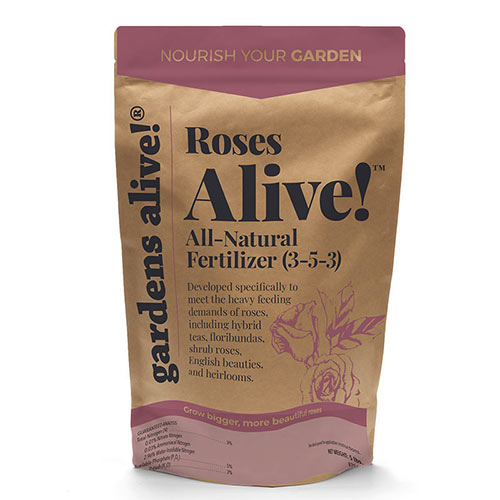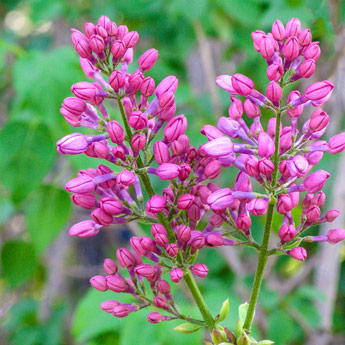Beetles? Slugs? The Many Foes of Roses
-
Helpful Products from Gardens Alive!
-
 Roses Alive!™ Fertilizer
Roses Alive!™ Fertilizer -
 Garden Pest Control Netting Tunnel
Garden Pest Control Netting Tunnel
Q. I'm fairly new to roses, so I planted three 'Knockout' variety roses I've been assured I cannot kill. But it appears that something still finds the leaves very tasty. I've attached a picture. What is eating my leaves and is there anything I can do to stop it? I haven't seen any Japanese beetles and it seems like whatever is happening happens overnight.
---Sarah in Virginia (specifically eastern Fairfax County)
A. "Knockout" roses? Do the buds look like little boxing gloves?
No, but that would be cool. "Knockout" roses were bred to be highly disease-resistant, but many people in the business fear that they've been overplanted and may be prone to other types of problems. They're certainly causing a lack of diversity in landscapes. (Feel free to plant some Knockouts, but intersperse them with other varieties, especially some of the 'older roses' to achieve the diversity that is one of the hallmarks of successful organic gardening.)
Now—to the best of my knowledge, those 'other problems' do not include insect attack. In my experience, serious pest problems on roses are most often caused by chemical fertilizers and people using chemical insecticide 'rose sprays' without knowing what they're doing. (The fertilizers cause unnaturally fast growth that's very attractive to pests; and indiscriminate sprays kill beneficial insects that would otherwise protect the plant.)
Anyway, the big reported problem with Knockouts is a tendency to contract a virus known as 'rose rosette' which produces weird-looking reddish shoots on the plant (I think these rogue shoots look a lot like young wild raspberry canes) and distorted flowers. If you catch it early and prune off all the bad growth, the plant may survive, but most sources consider it fatal.
(I, however, had it show up on a "Flower Carpet' landscape rose out in front of my house, didn't know what it was, pruned the bad stuff off and the plant looks just dandy now….)
But that's not the problem with Sarah's roses. And I've been seeing a lot of similar-looking damage on leaves that people have been bringing to my public appearances in the greater Philadelphia and DC regions. The leaves have been eaten in kind of a 'chunky' style—not the distinctive 'lacy' damage that Japanese and other scarab beetles cause. And Sarah notes that those bad beetles have not yet emerged in her DC area garden. (But stay tuned because we have an exciting announcement about Japanese beetle control coming up soon!) Foreshadowing—I love it!
Now, what's eating her roses?
The Spring of 2018 (when this missive is being mangled by me) has been wretchedly wet in Philly, DC and lots of other areas in the mid-Atlantic, so my first thought is slugs. The damage displayed is consistent with slug attack, and the little slimers do their dirty work at night, as she describes. And because they're rarely seen, they often escape the 'usual suspects' list.
So we're going to tell her to crack a beer. Wait until dusk, fill small saucers, cat food cans and/or half-pint containers with FRESH beer—NOT the 'stale beer' you may have heard recommended in folklore—and place these traps under the attacked plants. If slugs are the cause, the containers will be filled with dead drunken slimers in the morning.
Then you can either buy a case of cheap beer and repeat nightly; or buy one of the newer 'natural' slug baits whose active ingredient is iron phosphate. The pellets contain a yeasty bait to attract the slugs; but slugs can't process the iron in the bait and so they die. The bait is non-toxic to other creatures and is actually good for the soil when it degrades.
So right now, I think it is slugs, especially with all the rain we've had. But soon it will be Japanese and other scarab beetles…
"Scarab beetles?" Like in the Brendan Frazier 'Mummy' movies?
Eh, thankfully no. The term 'scarab beetle' refers to a closely related family of true beetles from Asia that overwinter in turf or other underground areas in the white grub stage and then emerge in adult form in the summer to feed on their favorite plants: roses, grapes, roses, raspberries…
…roses….
The Japanese and rose chafer beetle feed by day, but the sneaky Asiatic beetle flies and feeds by night. Like the slug, it often goes undetected. Luckily, the newest form of Bt, called BTG is back—and it stops them all!
You may recall that we talked about BTG back in 2015, but manufacturing problems quickly made it unavailable. Now it's finally back in stock here at GA under the brand name "BeetleJus".
(I know; I know—don't say that name out loud three times or Michael Keaton might show up.)
So: how does you-know-what work?
Exactly like the other Bts. You spray it on the plants under attack and it only harms the target insect eating the sprayed leaves. No effect on people, pets, butterflies, bees, frogs, toads, little fishies, etc. BTG will only kill members of the scarab beetle family that chew on the sprayed plants.
---Sarah in Virginia (specifically eastern Fairfax County)
A. "Knockout" roses? Do the buds look like little boxing gloves?
No, but that would be cool. "Knockout" roses were bred to be highly disease-resistant, but many people in the business fear that they've been overplanted and may be prone to other types of problems. They're certainly causing a lack of diversity in landscapes. (Feel free to plant some Knockouts, but intersperse them with other varieties, especially some of the 'older roses' to achieve the diversity that is one of the hallmarks of successful organic gardening.)
Now—to the best of my knowledge, those 'other problems' do not include insect attack. In my experience, serious pest problems on roses are most often caused by chemical fertilizers and people using chemical insecticide 'rose sprays' without knowing what they're doing. (The fertilizers cause unnaturally fast growth that's very attractive to pests; and indiscriminate sprays kill beneficial insects that would otherwise protect the plant.)
Anyway, the big reported problem with Knockouts is a tendency to contract a virus known as 'rose rosette' which produces weird-looking reddish shoots on the plant (I think these rogue shoots look a lot like young wild raspberry canes) and distorted flowers. If you catch it early and prune off all the bad growth, the plant may survive, but most sources consider it fatal.
(I, however, had it show up on a "Flower Carpet' landscape rose out in front of my house, didn't know what it was, pruned the bad stuff off and the plant looks just dandy now….)
But that's not the problem with Sarah's roses. And I've been seeing a lot of similar-looking damage on leaves that people have been bringing to my public appearances in the greater Philadelphia and DC regions. The leaves have been eaten in kind of a 'chunky' style—not the distinctive 'lacy' damage that Japanese and other scarab beetles cause. And Sarah notes that those bad beetles have not yet emerged in her DC area garden. (But stay tuned because we have an exciting announcement about Japanese beetle control coming up soon!) Foreshadowing—I love it!
Now, what's eating her roses?
The Spring of 2018 (when this missive is being mangled by me) has been wretchedly wet in Philly, DC and lots of other areas in the mid-Atlantic, so my first thought is slugs. The damage displayed is consistent with slug attack, and the little slimers do their dirty work at night, as she describes. And because they're rarely seen, they often escape the 'usual suspects' list.
So we're going to tell her to crack a beer. Wait until dusk, fill small saucers, cat food cans and/or half-pint containers with FRESH beer—NOT the 'stale beer' you may have heard recommended in folklore—and place these traps under the attacked plants. If slugs are the cause, the containers will be filled with dead drunken slimers in the morning.
Then you can either buy a case of cheap beer and repeat nightly; or buy one of the newer 'natural' slug baits whose active ingredient is iron phosphate. The pellets contain a yeasty bait to attract the slugs; but slugs can't process the iron in the bait and so they die. The bait is non-toxic to other creatures and is actually good for the soil when it degrades.
So right now, I think it is slugs, especially with all the rain we've had. But soon it will be Japanese and other scarab beetles…
"Scarab beetles?" Like in the Brendan Frazier 'Mummy' movies?
Eh, thankfully no. The term 'scarab beetle' refers to a closely related family of true beetles from Asia that overwinter in turf or other underground areas in the white grub stage and then emerge in adult form in the summer to feed on their favorite plants: roses, grapes, roses, raspberries…
…roses….
The Japanese and rose chafer beetle feed by day, but the sneaky Asiatic beetle flies and feeds by night. Like the slug, it often goes undetected. Luckily, the newest form of Bt, called BTG is back—and it stops them all!
You may recall that we talked about BTG back in 2015, but manufacturing problems quickly made it unavailable. Now it's finally back in stock here at GA under the brand name "BeetleJus".
(I know; I know—don't say that name out loud three times or Michael Keaton might show up.)
So: how does you-know-what work?
Exactly like the other Bts. You spray it on the plants under attack and it only harms the target insect eating the sprayed leaves. No effect on people, pets, butterflies, bees, frogs, toads, little fishies, etc. BTG will only kill members of the scarab beetle family that chew on the sprayed plants.
-
Helpful Products from Gardens Alive!
-
 Roses Alive!™ Fertilizer
Roses Alive!™ Fertilizer -
 Garden Pest Control Netting Tunnel
Garden Pest Control Netting Tunnel







 Gardens Alive! & Supplies
Gardens Alive! & Supplies




